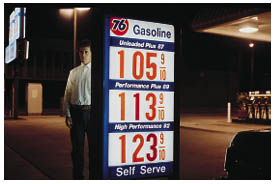 In this photograph, from the collection recently donated to the university
by Peter and Eileen Norton, photographer Philip Lorca di Corcia posed a
male prostitute next to a gasoline price sign.
In this photograph, from the collection recently donated to the university
by Peter and Eileen Norton, photographer Philip Lorca di Corcia posed a
male prostitute next to a gasoline price sign.
Notebook - March 22, 2000
Sophomores fill up eating clubs
Only Campus, with 35 new sign-ins, needs more
After the hors d'oeuvres were gone and the lottery drawn, bicker and sign-ins week ended February 5 with 79 percent of the sophomore class joining an eating club.
Of the 1,149 students in the Class of 2002, 398 successfully bickered, 410 signed in on the first round, and 94 signed in on the second round.
For those students who choose to be independent and who do not have kitchens
in their rooms, there are a number of options, including two student-run
cooperatives, open kitchens in many of the dorms, and the dining halls.
The Frist Campus Center will open this fall and offer meals through the
university's dining services. Stevenson Hall (83 and 91 Prospect), which
previously was available to independents, is likely to serve only boxed
lunches at 91 Prospect, according to Paul Breitman, director of the Frist
Campus Center. Paul Sigmund, master of Stevenson, had hoped that Stevenson
would be a viable alternative to the eating clubs, but 83 Prospect, where
Stevenson was going to operate, was recently allocated to the new Bobst
Center for Peace and Justice.
Princeton boycotts Yahoo's most-wired survey
You won't find Princeton listed in this year's Yahoo! Internet Life magazine survey (www.zdnet.com/yil/content/college/), which ranks college campuses according to how wired they are-nor will you find Harvard, Yale, Brown, Columbia, Duke, Stanford, and several other universities. Together, these schools are refusing to answer the online magazine's questions having to do with computer technology on campus because administrators at those universities believe Yahoo's methodology is flawed, especially in the ranking system.
"The survey doesn't do a good job of reflecting the goals and objectives of an institution," said Ira H. Fuchs, vice president for computing and information technology. "It uses a simple ordinal ranking for colleges and universities with widely differing information technology needs." For students and parents considering a residential university like Princeton, the number of online classes or the ratio of students to modems is far less significant than it would be for commuter schools, like City University of New York. According to Fuchs, the real question is whether an institution's goals are being well served by its information technology.
Princeton University had participated in the survey, which began in 1997, for the last three years with increasing misgivings. This year, said Fuchs, "we responded by not responding."
Robert Bernstein, Yahoo! Internet Life magazine's senior editor, has suggested that most of the boycotting institutions wouldn't have ranked well anyway. Last year, Princeton ranked 22nd.
-Diane Krumrey
Nortons give photographs to museum
 In this photograph, from the collection recently donated to the university
by Peter and Eileen Norton, photographer Philip Lorca di Corcia posed a
male prostitute next to a gasoline price sign.
In this photograph, from the collection recently donated to the university
by Peter and Eileen Norton, photographer Philip Lorca di Corcia posed a
male prostitute next to a gasoline price sign.
The Art Museum last month received a donation of 22 photographs from Peter and Eileen Norton, who in January announced they were donating 40 percent of their collection of contemporary art, or more than 1,000 pieces, to various institutions around the country.
Princeton's museum, which has a considerable holding in photography, will exhibit the Norton photographs later this year. At this point, no valuation has been given to the photographs, which were taken by Jo Ann Callis, Robert Dawson, Philip Lorca di Corcia, John Pfahl, and others.
Peter Norton, whose company, Peter Norton Computing Inc., developed the diagnostic software Norton Utilities and then merged with Symantec Corp. in 1990, began collecting during the 1980s. In his collection he concentrated on new works that embodied socially meaningful ideas in visually exciting forms.
The Nortons also gave work to the Museum of Modern Art and the Whitney Museum in New York, the Los Angeles County Museum of Art, the Tate Gallery in London, and to a nascent museum in New York called the Museum of Sex. Other institutions of higher learning due to receive art from the Nortons include Bard College, the University of Washington, the University of California at Berkeley, and the University of North Carolina at Greensboro.
Going back, going back: Alumni
return for lectures, lunch
New family activities draw attention
The U-Store bags told the story. On a gray, cold day, they were almost the only color, their distinctive white, orange, and black design peeking out of coat pockets, clenched in fists that should have worn gloves, swinging from the hands of children as they ran across Firestone Plaza. The profusion of bags on campus in late February could mean only one thing: It had to be Alumni Day.
Saturday, February 26 saw more than 1,400 alumni return to campus for the chance once again to hear a Princeton lecture, to eat lunch with classmates, to stroll the campus, and, of course, to pick up a few T-shirts for the kids and grandkids.
This year, in addition to the usual lectures for the adults-which included "South Africa After Mandela" by politics professor Jeffrey I. Herbst '83, "Emotions and Ethics" by classics professor Robert A. Kaster, and "Of Mice and Men" by molecular biology assistant professor Joseph Tsien-Alumni Council director M. Kathryn Taylor '74 scheduled a variety of family-oriented activities in hopes of attracting younger alumni. Alumni Day has always been disproportionately popular with older alumni; even after the first event in 1915, paw reported "the older alumni predominating."
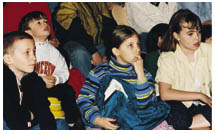 New events included a storyteller for elementary school children; a
play, written and performed by the student-run children's theater group
The Cotsen Players; a campus tour geared toward junior high school students;
and a "family lecture" on Maurice Sendak's Where the Wild Things
Are. A workshop hosted by Nick Allard '74 and Dean of Admission Fred Hargadon
led teenagers through the college admissions process. The Alumni Council
also provided, for the first time, "Winter Camp for Tiger Cubs,"
a variation on the Tiger Camp held each year during Reunions.
New events included a storyteller for elementary school children; a
play, written and performed by the student-run children's theater group
The Cotsen Players; a campus tour geared toward junior high school students;
and a "family lecture" on Maurice Sendak's Where the Wild Things
Are. A workshop hosted by Nick Allard '74 and Dean of Admission Fred Hargadon
led teenagers through the college admissions process. The Alumni Council
also provided, for the first time, "Winter Camp for Tiger Cubs,"
a variation on the Tiger Camp held each year during Reunions.
The family activities were well received, according to Taylor. "I got a lot of anecdotal feedback that the activities went well," Taylor said, "and we had a good turnout at the family programs." The Sendak lecture, she said, had to be moved from the children's library into Betts Auditorium because of its popularity, and the two showings of The Fairyland Detective Agency drew about 60 people each.
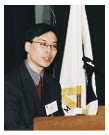 The afternoon's events adhered more closely to tradition. At the Alumni
Association luncheon, student and alumni award winners were honored. President
Harold Shapiro introduced the Porter Ogden Jacobus Fellowship winners, two
graduate students who displayed the highest scholarly excellence. This year's
winners were English student Jay Ladin and astrophysics student Xiaohui
Fan. Ladin, who quipped that "not being able to understand what I read
has been a major advantage to me," is redefining American poetry in
his dissertation. Fan, who Shapiro said saw an eclipse when he was a child
in China and then "never thought of being anything other than an astronomer,"
is exploring the most distant quasars in the universe, using them to study
the evolution of, and to map out, the universe.
The afternoon's events adhered more closely to tradition. At the Alumni
Association luncheon, student and alumni award winners were honored. President
Harold Shapiro introduced the Porter Ogden Jacobus Fellowship winners, two
graduate students who displayed the highest scholarly excellence. This year's
winners were English student Jay Ladin and astrophysics student Xiaohui
Fan. Ladin, who quipped that "not being able to understand what I read
has been a major advantage to me," is redefining American poetry in
his dissertation. Fan, who Shapiro said saw an eclipse when he was a child
in China and then "never thought of being anything other than an astronomer,"
is exploring the most distant quasars in the universe, using them to study
the evolution of, and to map out, the universe.
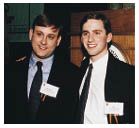 Shapiro next introduced this year's M. Taylor Pyne Prize winners, Michael
Bosworth '00 and Benjamin Sommers '00. Bosworth, a history major who in
his thesis is studying ideological shifts in the thinking of late 18th-century
politician George Clinton, said that for him, the university's unofficial
motto "In the nation's service" was "more than a slogan:
It's the purpose of an education here." Sommers, who Shapiro said was
described by one of his advisees as "magical; he can solve anything,"
is an English major writing his thesis on cultural dialogue between blacks
and Jews.
Shapiro next introduced this year's M. Taylor Pyne Prize winners, Michael
Bosworth '00 and Benjamin Sommers '00. Bosworth, a history major who in
his thesis is studying ideological shifts in the thinking of late 18th-century
politician George Clinton, said that for him, the university's unofficial
motto "In the nation's service" was "more than a slogan:
It's the purpose of an education here." Sommers, who Shapiro said was
described by one of his advisees as "magical; he can solve anything,"
is an English major writing his thesis on cultural dialogue between blacks
and Jews.
Chang-Lin Tien *59, NEC Distinguished Professor of Engineering and former chancellor of the University of California at Berkeley, received the James Madison Medal for graduate alumni. Tien spoke briefly on engineering becoming an integral part of a liberal arts education.
Forrest Eggleston '42 won the Woodrow Wilson Award for the undergraduate alumnus whose work best exemplifies Wilson's words, "in the nation's service." Eggleston, a missionary doctor who worked in India for 33 years, said that he had planned to be an astrophysicist before a Princeton professor advised him that "I should go into something working with people. It changed my life."
Following the luncheon, most returning alumni moved to the chapel for the annual Service of Remembrance.
Though Alumni Day is a low-key affair with far smaller attendance than Reunions, Alumni Council director Taylor still sees a place for the day on the alumni calendar. "It's a great time for people to come back and see the campus in action, with students there," Taylor said. She cites two other advantages to Alumni Day over Reunions: first, cost. "Alumni Day is our gift to the alumni," Taylor said, pointing out that the only charge for the day is the $20 per person fee that supports the lunch.
The second advantage, Taylor said, is that whereas Reunions are organized
by and for the individual classes, Alumni Day is for the entire Princeton
alumni community. At the ceremony, she said, there are awards for current
students and awards that go to members of "the most venerable of classes."
"When at Reunions do you have a gathering of the entire body of alumni?"
Taylor asked. "At the Alumni Day luncheon you're talking, visiting,
seeing Princeton at its best."-J.C.M.
The Woodrow Wilson Award, given to an undergraduate alumnus or alumna exemplifying Princeton in the nation's service, was awarded to Forrest C. Eggleston '42, M.D., who was a medical missionary for 30 years. In 1953, Eggleston, along with his wife, Barbara, went to India to run a small tuberculosis clinic. He later became a professor and head of the department of surgery at the Christian Medical College and its associated hospital in Ludhiana. After he retired, he and his wife were volunteers in Cameroon; they now live in Mechanicsburg, Pennsylvania.
The Madison Medal, awarded to an alumnus or alumna from the Graduate School who has had a distinguished career, advanced the cause of graduate education, or achieved an outstanding record of public service, was given to Chang-Lin Tien *59. Tien, a professor and former chancellor of the University of California at Berkeley, was born in China and earned his doctorate in mechanical engineering. A naturalized citizen, Tien has been active in organizations dedicated to enhancing communications between East and West and promoting democracy. The Madison Medal was named for James Madison, Princeton's first graduate alumnus.
The Moses Taylor Pyne Prize, the university's highest general award for undergraduates, was shared by Michael Bosworth '00 and Benjamin Sommers '00. Bosworth, a history major from Great Neck, New York, created the Princeton Millennium Project, a series of lectures given by notable leaders in their respective fields; earned several top academic honors, including the President's Award for Academic Achievement, the Carter Kim Combe '74 Prize for the best junior paper in the history department, and the Koren Prize for the best overall record in history in the junior year; and served in many leadership roles on campus. He plans to attend Yale law school this fall.
Sommers, an English major who is also pursuing a certificate in the Program in Jewish Studies, has never received a grade below an A at Princeton while taking an unusually heavy course load. He was named the Class of 1939 Princeton Scholar, an honor awarded for highest academic standing in all previous years, and he received the Manfred Pyka Memorial Physics Prize for exceptional performance in physics in 1998. In the area of community work, Sommers has been involved with the Princeton Model Congress, the American Jewish Committee, the Health Policy Leadership Institute, and the trauma division of the University of Cincinnati Hospital. Sommers, who is from Loveland, Ohio, plans to attend medical school or graduate school this fall.
The Class of 1926 Trophy, which goes to the class that raises the largest amount creditable to Annual Giving within each campaign, was given to the Class of 1974, which set a 25th-reunion record and an all-time record for any Princeton class. The class gave $5,019,740.
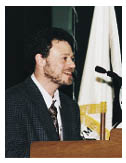 The Porter Ogden Jacobus Fellowship was awarded to Jay Ladin,
a graduate student in the English department, and to Xiaohui Fan, an observational
astrophysicist in the astrophysical sciences department. The fellowship,
which provides full tuition and a stipend for a year of study, goes to a
graduate student from the humanities and social sciences department and
one from the natural sciences and engineering departments. Ladin, who is
from Rochester, New York, earned his bachelor's degree at Sarah Lawrence
and an M.F.A. at the University of Massachusetts at Amherst. Fan is from
the People's Republic of China and earned his bachelor of science at Nanjing
University and his master of science degree at Beijing Astronomical Observatory.
The Porter Ogden Jacobus Fellowship was awarded to Jay Ladin,
a graduate student in the English department, and to Xiaohui Fan, an observational
astrophysicist in the astrophysical sciences department. The fellowship,
which provides full tuition and a stipend for a year of study, goes to a
graduate student from the humanities and social sciences department and
one from the natural sciences and engineering departments. Ladin, who is
from Rochester, New York, earned his bachelor's degree at Sarah Lawrence
and an M.F.A. at the University of Massachusetts at Amherst. Fan is from
the People's Republic of China and earned his bachelor of science at Nanjing
University and his master of science degree at Beijing Astronomical Observatory.
The S. Barksdale Penick, Jr. '25 Award, given to outstanding Alumni Schools Committees, went to the alumni schools committee of the Princeton Club of Dallas/Fort Worth, chaired by Brill Aldridge Garrett '88, and the Princeton Area Alumni Association, whose executive committee includes Bob Rodgers '56, Michael Faigen '73, David Woffindin '75, Linda Bell Blackburn '71, and Rod McNealy '72.
The Alumni Council Award for Community Service went to the Class of 1942 for the numerous efforts by members of the class in the area of community service. Among the class's initiatives are The Class of '42 Horton-Elmer Fund, the Gifts and Grants program, and the Bud Vivian '42 Community Service Award.
The Harold H. Helm '20 Award, a prize that recognizes exemplary and sustained service to Annual Giving, was awarded to John R. Guthrie '42 of Annandale, Virginia.
The Jerry Horton Award honors the memory of Arthur J. Horton '42, former director of Annual Giving, and is presented to an outstanding regional Annual Giving committee. This year's winner is the regional committee from Charlotte, North Carolina, chaired by Peter K. K. Thompson '70.
Madison Medalist Tien calls for
a Marshall Plan for education
A "knowledge gap" is growing in this country, he says
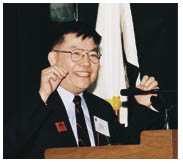 He may not have realized his tongue-in-cheek dream of playing NBA basketball,
but Madison Medalist Chang-Lin Tien *59 has been a major player-in developing
links with Asian countries, in university education, and in the field of
mechanical engineering. On Alumni Day the 5'6" Tien offered a perspective
on today's world from his vantage point. He even proposed a game plan for
the future.
He may not have realized his tongue-in-cheek dream of playing NBA basketball,
but Madison Medalist Chang-Lin Tien *59 has been a major player-in developing
links with Asian countries, in university education, and in the field of
mechanical engineering. On Alumni Day the 5'6" Tien offered a perspective
on today's world from his vantage point. He even proposed a game plan for
the future.
Tien's talk, "Innovation and Technology in the New Global Economy," touched on several trends the NEC Distinguished Professor of Engineering and former chancellor at the University of California, Berkeley, sees converging: a new era of democracy powered by free markets, the merger of technology and communication, and globalization.
These economic realities call for a Marshall Plan for education, said the Chinese-born naturalized citizen. Rather than a military battleground, the global marketplace is where the action is, and knowledge is what's needed to compete.
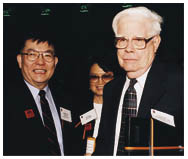 "We had the Marshall Plan for economic renewal. Now with our knowledge-based
economy, perhaps we need a Marshall Plan for education. We can do a lot
with the Internet for raising educational levels in developing countries
as well as in our own backyard," Tien suggested.
"We had the Marshall Plan for economic renewal. Now with our knowledge-based
economy, perhaps we need a Marshall Plan for education. We can do a lot
with the Internet for raising educational levels in developing countries
as well as in our own backyard," Tien suggested.
Tien called the end of the 20th century the beginning of a new era of economic democracy, where the free market will determine who the players are. "It looks like we won't have any great wars. Most struggles will be played out in the marketplace," he predicted.
Fueling the marketplace is the merger of technology and communication where innovation and creativity play significant roles: "If you start new, you have the whole market," Tien said, using Microsoft's Windows and the Web browser Yahoo! as two examples.
Globalization, while controversial, cannot be resisted, he added. On his frequent forays abroad-he had visited Asia twice in the three weeks before Alumni Day and has been active in the Pacific Council on International Policy, the Council on Foreign Relations and other organizations of East-West dialogue-Tien said he encourages leaders in developing nations to modernize and develop their markets simultaneously. But he cautioned: "The United States is the only economic superpower in the world. The gap between the U.S. and the rest of the world is getting bigger. We have to think of world peace."
On the home front, we in the U.S. must pay attention to the "digital divide" developing between public and private schools, as well as social problems that rise from income distribution and racial issues. Tien, whose Berkeley tenure included a strong commitment to affirmative action, noted that a knowledge gap is growing in this country, due to the poor condition of our secondary schools. "If we don't prepare youngsters well enough, we will have to import people from China, India-and that's not a solution," he warned.
Tien's own story includes fleeing his home twice with his family, first to Shanghai and later to Taiwan. After graduating from National Taiwan University, he came to this country in 1956. He earned a master's at the University of Louisville before coming to Princeton for a second master's and his Ph.D. He was the first Asian American to head a major research university in the U.S.
Tien, who served on Princeton's Board of Trustees from 1991 to 1995, concluded his speech by saying a liberal arts education is fundamental to preparing students for the rapid changes facing them. As he accepted his award in Jadwin Gym, he added that engineering plays a vital role in innovative technology, which makes it an important part of a liberal arts education.
And also at Jadwin, gazing nostalgically at the scoreboard, he gave this parting shot: "Nothing would thrill me more than Princeton becoming a basketball power replacing Stanford." n
-Maria LoBiondo
Note: The Alumni Day lecture scheduled to be delivered by Wilson Award
winner Forrest Eggleston '42, M.D., was canceled because of an illness in
Eggleston's family.
GO TO the Table of Contents of the current issue
GO TO
PAW's home page